| |

A singing sergeant
A 22-year veteran

Air Force Band
Army Band
Army Field Band
Coast Guard Band
Marine Band
Navy Band

Everyone Loves a Parade
Melodic Military Eagles
A Career Beyond Measure
'Life is a Gift' |
|
|
It’s the final salute from a grateful nation. The military funerals at Arlington National Cemetery, across the Potomac River from Washington, D.C, are filled with symbols and rituals — the honor guard, the folding of the American flag, the music from a military band.
Army Staff Sgt. Tom Dell’Omo (’97, ’00 M.M.) says it’s the most important part of his job as a military band member.
“It’s one of the most rewarding things I do, particularly in those cases when there are no next of kin. We are there to give the final sendoff. It’s a very powerful thing and it stays with you.”
Dozens of alumni from the UNT College of Music are wearing the uniforms of the U.S. military as members of the major service bands — Army, Navy, Air Force, Marines and Coast Guard, as well as the Army Field Band. Given the limited number of positions and their visibility, the jobs are highly sought after. Prospective members must audition to join, and to perform with the Army, Navy and Air Force bands, they must go through basic training — everything from physical conditioning to marksmanship.
Based in and around Washington, D.C., the bands have concert or ceremonial units as well as units specializing in everything from jazz and contemporary music to choral works and chamber music (the jazz groups are full of former North Texas students). The bands tour the country for several months each year, with occasional international tours, playing for students, civilians and service members alike. As with most musicians, when the band members aren’t performing, their days are filled with rehearsals and practice.
Here’s a closer look at a few of the UNT alumni serving as members of the concert or ceremonial bands of each service.
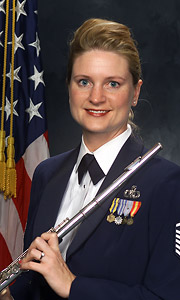 Master Sgt. Stacy Newbrough Ascione Master Sgt. Stacy Newbrough Ascione
(’96), flute, Air Force Band
- Played with a regional Air Force band based in California before becoming a member of the Air Force Band — “In all honesty, the appeal of security and a steady job was important. Competition for orchestras can be very intense.”
- Says her degree in flute performance at UNT gave her a successful musical foundation
- She’s proud to represent the troops on duty — “Our job is to bridge the gap between the civilians and the military.”
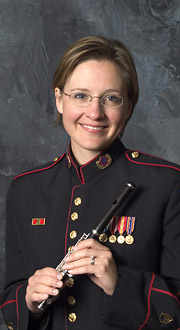 Sgt. First Class Natalie Boyd Klima Sgt. First Class Natalie Boyd Klima
(’00 M.M.), U.S. Army Field Band, piccolo
- Always wanted to play the flute professionally — “When I won the audition for the field band, I decided it was an opportunity I couldn’t pass up.”
- Played in the Wind Symphony and Symphonic Band at UNT
- Says basic training was mentally challenging — “But I only had to do it once.”
- Enjoys traveling with her husband (whom she met in the band), performing for grateful audiences and visiting every state — “We played in Barrow, Alaska, and had to fly back down to Anchorage in C-130s. I got to see Mount McKinley bathed in moonlight with the aurora borealis dancing in the sky. It was just breathtaking.”
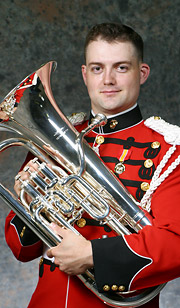 Staff Sgt. Mark Jenkins Staff Sgt. Mark Jenkins
(’03), euphonium, Marine Band
- Saw the Marine Band perform when he was 12 years old — “I thought those guys were the best at what they did, and then and there I thought that is what I wanted to do.”
- Notes the historical events at which the band has played — “We do a couple of state dinners a year and marched as a group during former President Reagan’s funeral in 2004.”
- A favorite memory is playing on the White House balcony for President George W. Bush
- Credits UNT euphonium professor Brian Bowman for his encouragement and support
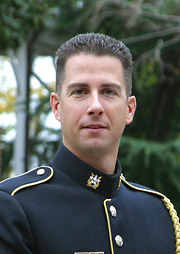 Staff Sgt. Tom Dell’Omo Staff Sgt. Tom Dell’Omo
(’97, ’00 M.M.), percussion, Army Band
- First studied percussion at age 10 and attended a performing arts high school in Maryland
- At UNT was a member of the drum line and was used to the strict discipline —“I found my identity there, and it was where my strength came from.”
- Says basic training was at a whole different level — “The hardest thing was for me to go through learning about teamwork with much younger soldiers; it was a real challenge. Before this, I thought I could handle myself.”
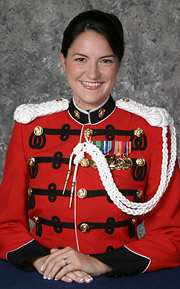 Staff Sgt. Sara Sheffield Dell’Omo Staff Sgt. Sara Sheffield Dell’Omo
(’01), vocalist, Marine Band
- In May 2005 became the first female vocalist in the history of the U.S. Marine Band
- Likes the musical variety the job provides — “The Sept. 11 anniversaries are always moving. Last year I sang at the Pentagon service. The Marine Band does a lot of diverse works; usually the summer concerts tend to be lighter, and the spring and fall concerts are more classical music.”
- Married to Army band percussionist Tom Dell’Omo, but there’s no musical or military rivalry in their family — “He loves his work over there, and I love mine.”
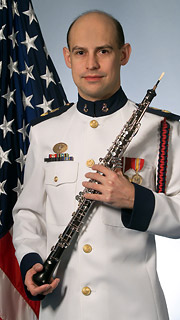 Chief Musician Barrett E. Seals Chief Musician Barrett E. Seals
(’99 M.M.), oboe and English horn, U.S. Coast Guard Band
- Says playing with a premier military band is a great job — “It pays very well, has great job benefits, and I’m playing my instrument in a world where there are very few performance jobs and many more players.”
- Cites the influence of UNT’s Charles Veazey, “who is without a doubt one of the best oboe teachers in the country and a wonderful man to work with,” and Eugene Corporon, “an amazing conductor who taught me a great deal about musicianship”
- Remembers two favorite band moments — “Probably the most exciting moment I’ve had so far was playing on The Price is Right during a military appreciation show they were doing and getting to meet Bob Barker and see the amazing ‘Wheel.’ Probably the most emotional moment I’ve had so far in the band has been playing at the funeral of President Ronald Reagan. Growing up during those years while he was president and being around all of those heads of state made it an emotional day.”
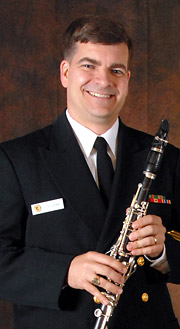 Chief Musician James Logan Chief Musician James Logan
(’88), clarinet section leader, Navy Band
- Has played the clarinet since fifth grade
- Joining the Navy Band was a long-term career goal — “The location and the history were big factors for me. I’ve been drawn to Washington, D.C., since seventh grade.”
- At UNT, he auditioned for clarinet professors James Gillespie and John Scott — “I took a 27-hour bus ride from my home in Iowa to come to Denton.”
- Was older than most of the people going through basic training — “I was going through it with others who were just out of high school. That was the hardest part. As far as the physical challenges, they just weren’t that big a deal.”
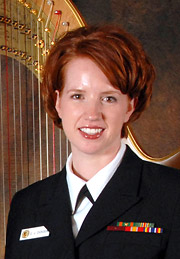 Chief Musician Emily Fisher Dickson Chief Musician Emily Fisher Dickson
(’97), harp, Navy Band
- Daughter of UNT Symphonic Band director Dennis Fisher
- Says basic training was an eye-opening experience — “It gave me strength and boosted my character. And, I remembered my grandmother used to tell me, ‘You can survive anything, as long as it lasts only eight weeks.’”
- One of her most memorable performances was a private lunch between then Vice President Al Gore and the president of France
- Enjoys doing concerts for the public — “Especially when we go on tour, we see how the public relates to what we do. They are so grateful to see us, especially the veterans and their families.”
Military band beginnings
The U.S. Marine Band, established by President John Adams in 1798, is the oldest professional music organization in the country. Its primary mission is to provide music for the president. It was given the title “The President’s Own” by Thomas Jefferson. John Philip Sousa, its best known leader, took command in 1880. The U.S. Army Band is known as “Pershing’s Own” after its founder, Gen. John “Black Jack” Pershing. It was founded in 1922. The U.S. Navy Band was officially designated in 1925, but the band’s roots go back to the early 1800s. The U.S. Coast Guard Band was organized in 1925, and the Air Force Band and Army Field Band were formed in the 1940s. 
|
|


 Master Sgt. Stacy Newbrough Ascione
Master Sgt. Stacy Newbrough Ascione Sgt. First Class Natalie Boyd Klima
Sgt. First Class Natalie Boyd Klima Staff Sgt. Mark Jenkins
Staff Sgt. Mark Jenkins Staff Sgt. Tom Dell’Omo
Staff Sgt. Tom Dell’Omo Staff Sgt. Sara Sheffield Dell’Omo
Staff Sgt. Sara Sheffield Dell’Omo Chief Musician Barrett E. Seals
Chief Musician Barrett E. Seals Chief Musician James Logan
Chief Musician James Logan Chief Musician Emily Fisher Dickson
Chief Musician Emily Fisher Dickson